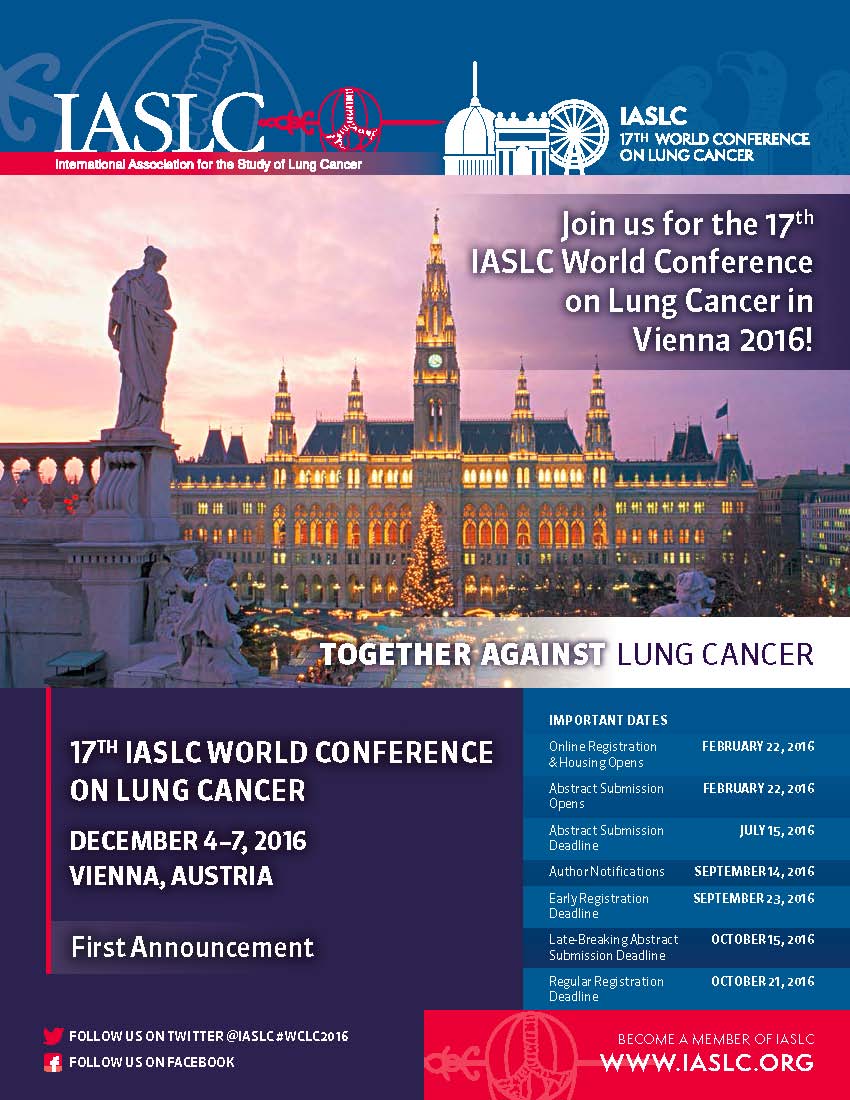Advocacy and Community Health Care Models Complement Research and Clinical Care
World Experts Convene in Vienna, Austria at the International Association for the Study of Lung Cancer 17th World Conference on Lung Cancer
 Vienna, Austria—December 4, 2016—Global lung cancer researchers and patient advocates today emphasized that new models of delivering care and communicating about cancer care play an important role in the fight against lung cancer. Their remarks come on the first day of the IASLC 17th World Conference on Lung Cancer (WCLC) in Vienna, Austria.
Vienna, Austria—December 4, 2016—Global lung cancer researchers and patient advocates today emphasized that new models of delivering care and communicating about cancer care play an important role in the fight against lung cancer. Their remarks come on the first day of the IASLC 17th World Conference on Lung Cancer (WCLC) in Vienna, Austria.
Dr. Laurie Gaspar of the University of Colorado reported that shared decision making (SDM) between patients and their physicians can improve communications about cancer care. Patients and clinicians agree SDM is recognized as a desirable goal in the treatment of lung cancer. However, both patients and clinicians agree SDM may be improved upon with the use of Patient Decision Aids (PDAs)
Gaspar conducted a survey of lung cancer patients who reported that decisions regarding systemic therapy, such as chemotherapy, were the most commonly perceived difficult decision (58 percent) and/or tests that were done or not done (34 percent). Sources of difficulty were identified as insufficient information (44 percent) and conflicting information or recommendations from their physicians (34 percent).
Most of the 190 patients who responded said they desired SDM, with only nine percent expressing the desire to make the decision alone. Of 90 respondents who viewed the PCI PDA, 61 percent felt that this type of decision aid would have been helpful.
“One of the difficulties patients face is when they have to weigh one doctor’s view with another,” Gaspar said. “One way to alleviate this is to use a multi-disciplinary process where all doctors can discuss patient care together.”
Dr. Raymond Osarogiagbon from Baptist Cancer Center in Houston reported that using a Center of Excellence (COE) model that focuses on underserved areas allows doctors to diagnose lung cancer patients in those areas early and provide treatment that is on par with lung cancer care offered at academic medical centers.
“Four out of five lung cancer patients are treated in a community hospital setting and may not receive the same level of care as those treated at a leading academic center; so, if we are going to move the needle on lung cancer care, we must do it where patients receive their care,” he said.
Osarogiagbon explained that the COE program is a patient-centric model for lung cancer that establishes a standard of care for community hospitals which often treat minority and underserved patient populations. The COE program has been in operation for three years and currently includes 13 hospitals in underserved areas.
The COE program tracks patient data for quality-of-care metrics, including disease stage at diagnosis; molecular testing; tumor board review; time from diagnosis to treatment; treatment type; and clinical trial participation. Site data is also monitored to provide a contextual picture of the program including total patients seen, demographics, insurance mix, rates and outcomes of molecular testing, among other metrics. Data is analyzed across the COE community and against comparable groups to demonstrate impact of the COE program.
“Lung cancer patients in a COE model show outcomes equivalent to patients who get care at top-tier research hospitals,” he said.
The press briefing ended with a summary of the mesothelioma workshop by Dr. Michele Carbone, University of Hawaii, on new mesothelioma research. Dr. Carbone previously identified a gene, BAP1, that when mutated, causes mesothelioma in certain families. At the press briefing, he shared that he has extended his research from Turkey and is now focusing on China. He hopes to publish his new findings in IASLC’s Journal of Thoracic Oncology in 2017.
About the WCLC:
The WCLC is the world’s largest meeting dedicated to lung cancer and other thoracic malignancies, attracting more than 6,000 researchers, physicians, and specialists from more than 100 countries. The goal is to increase awareness, collaboration, and understanding of lung cancer, and to help participants implement the latest developments across the globe. Organized under the theme of “Together Against Lung Cancer,” the conference will cover a wide range of disciplines and unveil several research studies and clinical trial results. For more information, visit http://wclc2016.iaslc.org/.
About the IASLC:
The International Association for the Study of Lung Cancer (IASLC) is the only global organization dedicated to the study of lung cancer. Founded in 1974, the association’s membership includes more than 5,000 lung cancer specialists in over 100 countries. Visit www.iaslc.org for more information.
